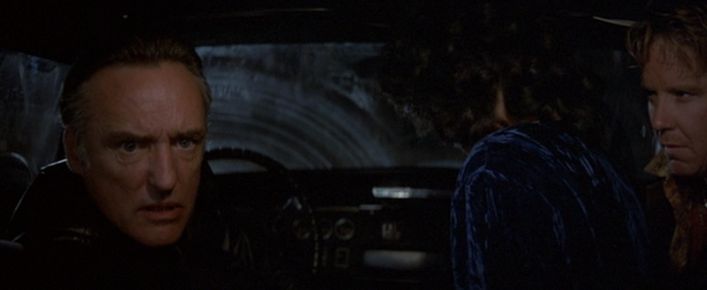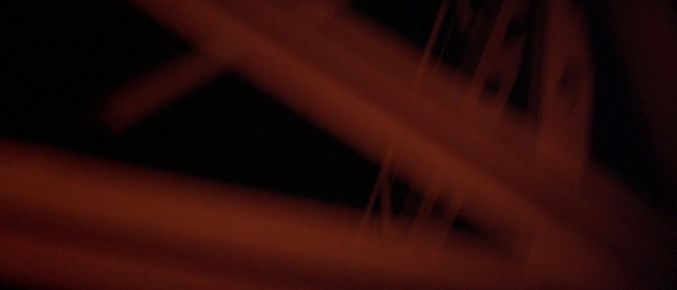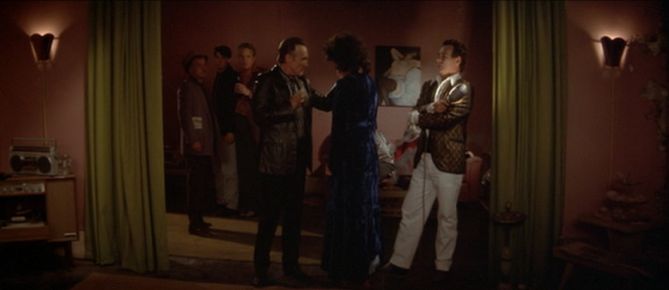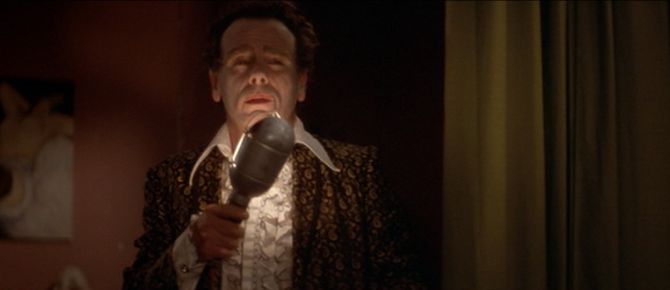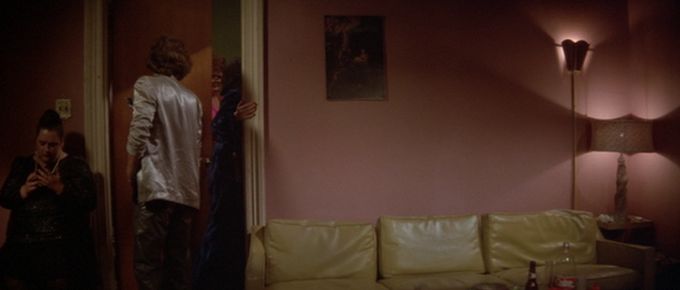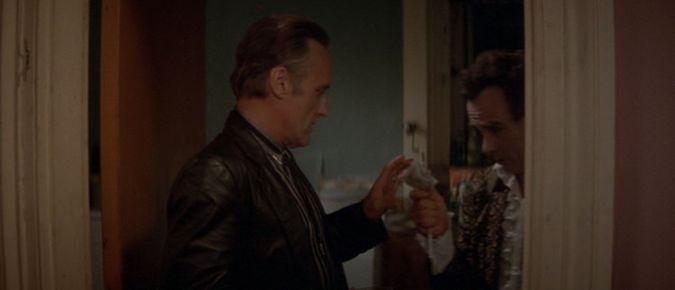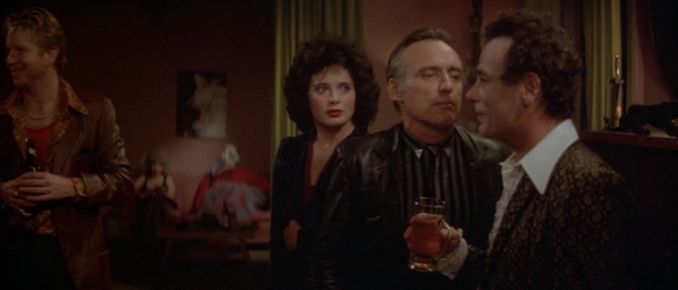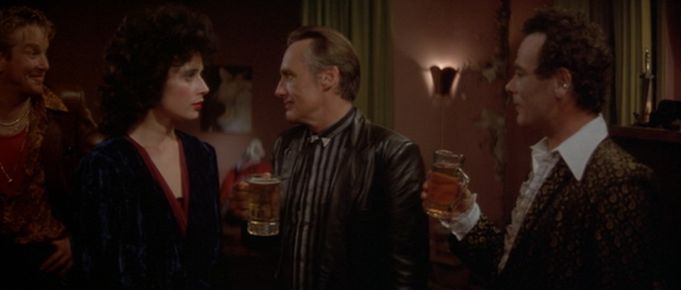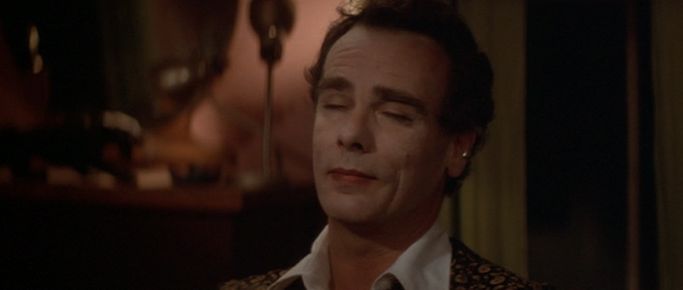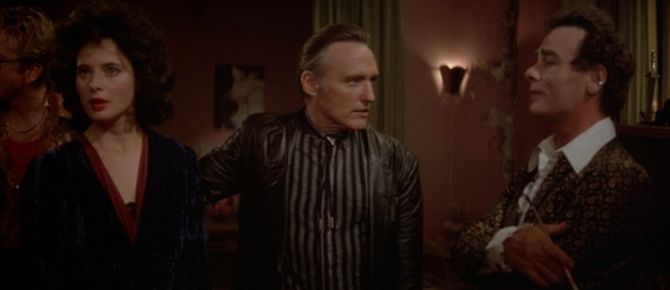The Blue Velvet Project
Blue Velvet, 47 seconds at a time by Nicholas Rombes
-
 The Blue Velvet Project, #105
The Blue Velvet Project, #105
Second #4935, 82:15 1. The car has come to a halt. Jeffrey’s crime has been to look at Frank, just as we also have been looking at the film itself. 2. “I shoot when I see the whites of the eyes,” Frank says at this moment, almost directing his stare at us, but not quite. This is either the statement of a psychopath or of a film director. 3. In Don DeLillo’s 1997 novel Underworld, there are these sentences: There is no space or time out here, or in here, or wherever she is. There are only connections. Everything is… Read more
-
 The Blue Velvet Project, #104
The Blue Velvet Project, #104
Second #4888, 81:28 The red, terrifying beauty of the bridge truss as Frank and his gang take Dorothy and Jeffrey on a joy ride “out to the fuckin’ country.” These shots of the truss underside, bathed in light that may as well emanate from hell, are a sort of reverse-universe visual analogy of the earlier nighttime shots of the underside of trees as Jeffrey walks down his street. In Robert Bolaño’s novel 2666, in the section “The Part about the Critics,” each of the three main characters has a different and disturbing dream on the same night: Espinoza dreamed about… Read more
-
 The Blue Velvet Project, #103
The Blue Velvet Project, #103
Second #4841, 80:41 1. The spell is broken. Frank has shut off the song. Ben seems insulted, and punishes Frank with silence. Dorothy refuses to smile. A joy ride is suggested. Paul’s (Jack Nance’s) shadow offers evidence of a hidden light. There is also a folded newspaper or magazine in his jacket pocket. 2. In October 1986, the month after Blue Velvet’s release, Ronald Regan delivered a speech at the Republican Governors Association Dinner. He used the word revolution numerous times, and spoke of permanently altering the balance of power: But if I could, tonight, I’d like to take a… Read more
-
 The Blue Velvet Project, #101
The Blue Velvet Project, #101
Second #4747, 79:07 You, in one part of your brain, know that Ben is not really singing at this moment. But then, Roy Orbison is not singing, either. He is dead, although he was alive at the time of Blue Velvet (and credited the use of “In Dreams” in the film to helping revive his career). You know it’s lip-synched, and yet somehow it’s not. It can’t be. If this seems like a contradiction, then consider that the entire scene is a special case of black magic, culminating in Frank’s literal disappearance from the screen in a few minutes in… Read more
-
 The Blue Velvet Project, #100
The Blue Velvet Project, #100
Second #4700, 78:20 “Donny! Donny! Donny, no! No! Donny mommy loves you!” This is moments after Frank has said, in reference to Dorothy, “Let Tits see her kid.” The tenderness of her hand upon the door molding. A glimpse of a woman in pink in the room with Donny. “What the real world is: that is a very difficult problem” (Haruki Murakami, IQ84). The two lamps in the corner of the room. Who puts two lamps in the same space? Dorothy’s hand, again, the elegant length of her fingers, and the hands of the woman sitting beneath the light switches.… Read more
-
 The Blue Velvet Project, #99
The Blue Velvet Project, #99
Second #4653, 77:33 The sidebar exchange between Frank and Ben, and an exchange of money, too, and a mysterious slip of paper. Ben drops a pill into Frank’s mouth. Frank, in return, says something cryptic about Detective Gordon (Fred Pickler). Another frame-within-a-frame, as the doorframe moldings serve as movie screen curtains. In his essay “Theater and Cinema, Part II,” André Bazin wrote that a screen is not a frame like that of a picture but a mask which allows only part of the action to be seen. When a character moves off screen, we accept the fact that he is… Read more
-
 The Blue Velvet Project, #98
The Blue Velvet Project, #98
Second #4606, 76:46 Frank has just hurt Jeffrey, and now it’s Ben’s turn. A casual sort of hurtfulness. The frame comes from second number 6 in a shot that lasts just over 53 seconds. In the background, staring back at the camera (at us) is the same Party Girl from earlier. The frame, cut vertically by the curtain and Dorothy’s right arm, is pulled apart by a clash of gazes and lines of vision: Dorothy’s and Frank’s leading our eyes toward Ben, and Ben’s and Hunter’s leading our eyes towards off-screen Jeffrey. In Barry Gifford’s 1990 novel Wild at Heart… Read more
-
 The Blue Velvet Project, #97
The Blue Velvet Project, #97
Second #4559, 75:59 Could it be that Dorothy is gazing not at Frank, but at Ben, the one who holds her son hostage in his apartment? If so, it’s not a meaning that registers upon watching the movie in real time. But at this moment—the moment of the isolated frame—a different layer of information is revealed. Separated from the frames that come immediately before and after it, does the solitary frame mean something different when studied as an image in its own right? Is a single film frame from a movie with over 170,000 frames the equivalent to a single… Read more
-
 The Blue Velvet Project, #96
The Blue Velvet Project, #96
Second #4512, 75:12 Dean Stockwell has said that he based his character Ben on a Carol Burnett sketch: “You know that thing that I do with my eyes? Carol Burnett had a character of this super snooty woman and she was always like this. I stole it and I told her one time and she laughed her head off when I told her.” And in an alternate-universe sort of way, this entire sequence at Ben’s is like one of the extended Carol Burnett Show sketches from the mind 1970s, with Harvey Korman and Tim Conway. The awkward pauses, the physical… Read more
-
 The Blue Velvet Project, #95
The Blue Velvet Project, #95
Second #4465, 74:25 1. Dorothy and Frank split their angles of vision; everyone is watching everyone. But it is Dorothy who suggests and defines the off-screen space, the space where Donny is kept behind a closed door. 2. Ben has just said, to one of the Party Girls, “Darling, could you bring some glasses, and we’ll have a beer with Frank. Please, sit down.” 3. Ben’s quiet formalism is not at all ironic. Rather, his decorum (which Frank calls “suave”) suggests that there is a proper and an improper way to conduct matters of evil in this world, and his… Read more
